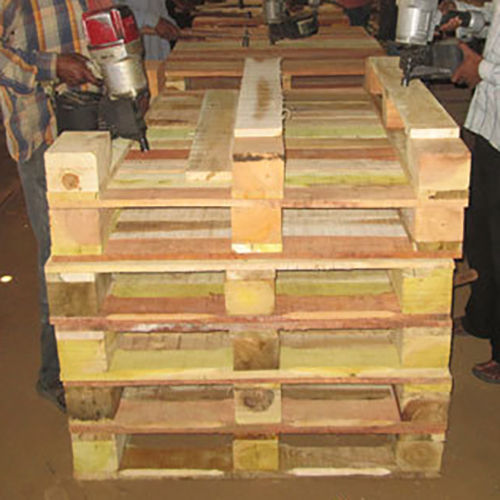The amazing Ecological Benefits from Utilizing Lumber Platforms

In this contemporary landscape, where sustainable practices and environmental responsibility are of utmost importance, the decision of materials used in warehouses has become increasingly important. Among various various options available, timber pallets are notable not just for their practicality but also for their eco-friendliness. As businesses seek to reduce their environmental impact, the integration of these sustainable materials is not just beneficial for the ecosystem; it additionally offers numerous gains for operational efficiency and operations.
Timber pallets are crafted from a renewable product, and their manufacturing generates a markedly reduced greenhouse gas output compared to plastic or metal choices. Moreover, they encourage a system of reuse and recycling, contributing to a greener supply chain. Using custom pallets tailored to customized warehouse needs can greatly improve their effectiveness, making them an critical component in contemporary warehousing and inventories. Embracing wooden pallets not only reinforces sustainability efforts but simultaneously coincides with the rising consumer demand for businesses focused on environmental responsibility.
Eco-friendliness of Natural Pallets
Natural pallets are a eco-friendly choice for warehousing due to their ability to be repurposed and recycled. Unlike composite pallets, natural pallets can serve several cycles before they need to be discarded. After their useful life in shipping, these pallets can be repurposed into other products or even used as raw material for fresh pallets. This recurrent cycle limits waste and decreases the negative effects associated with creating new materials.
Another factor of eco-friendliness with natural pallets is their green origins. Many natural pallets are made from timber harvested from responsibly harvested forests. When companies choose to utilize approved wood, they support practices that ensure forests are maintained and renewed. This helps maintain biodiversity and contributes beneficially to natural habitats. Additionally, using locally sourced wood minimizes the transport impact related to transportation, further enhancing their environmental gains.
Moreover, the production of wooden pallets has a reduced energy requirement compared to competing materials like plastic or steel. The production process for wood requires fewer fossil fuel energy and tends to produce lower greenhouse gas emissions. As the push for more sustainable supply chains progresses, timber pallets can be a crucial component in helping distribution centers reduce their overall negative effects on the environment, promoting a eco-friendly future in industrial operations.
Decreasing of Carbon Footprint
The employment of wooden pallets considerably contributes to the reduction of carbon footprints in fulfillment operations. Unlike polymer or metal alternatives, wooden pallets are biodegradable and can quickly decompose. This means that when they reach the conclusion of their usable life, they do not contribute to landfill waste in the same manner synthetic materials do. By employing materials that are naturally sourced and can return to the earth, companies can engage in more environmentally responsible practices that align with environmental goals.
In addition, wooden pallets are chiefly made from regenerative resources. Timber used for pallet production can be replanted, ensuring a constant supply of materials without exhausting forests. When sourced ethically, wooden pallets help maintain balance in ecosystems, contributing to the capture of carbon dioxide while also providing habitats for various species. This loop of growth and renewal is essential in combating climate change and promoting a healthier planet.
In addition to their sourcing advantages, wooden pallets are often lighter than their polymer or aluminum counterparts, leading to reduced energy consumption during shipping. This decrease in weight translates to lower fuel usage, which further contributes to lessened greenhouse gas emissions. By choosing wooden pallets, warehouses not only enhance their operational efficiency but also play a key role in minimizing environmental impacts, supporting their dedication to sustainability in the supply chain industry.
Biodegradability and Recycling Solutions

Timber pallets offer significant environmental advantages due to their natural biodegradability. Unlike plastic pallets, which can take centuries to break down, wooden pallets can decompose fairly swiftly when disposed of in an appropriate manner. When wooden pallets reach the end of their useful life, they can reintegrate into the ecosystem, enriching the soil and supporting plant growth as they decompose, which aligns with sustainable practices.
In addition to being biodegradable, wooden pallets have various recycling options that improve their eco-friendliness. Many companies participate in pallet recycling programs where used pallets are collected, fixed, and reused. pallets in tulsa reduces waste but also saves resources by reducing the need for new materials. Recycled wooden pallets can maintain their structural integrity, offering warehouses a dependable option while promoting sustainability.
Furthermore, the lifespan of wooden pallets can be lengthened through refurbishing efforts. Broken or unusable pallets can be dismantled for parts, allowing them to be converted into new pallets, furniture, or other wooden products. This ability to recycle and refurbish wooden pallets minimizes landfill waste and promotes responsible consumption, making them an outstanding choice for environmentally conscious businesses.
